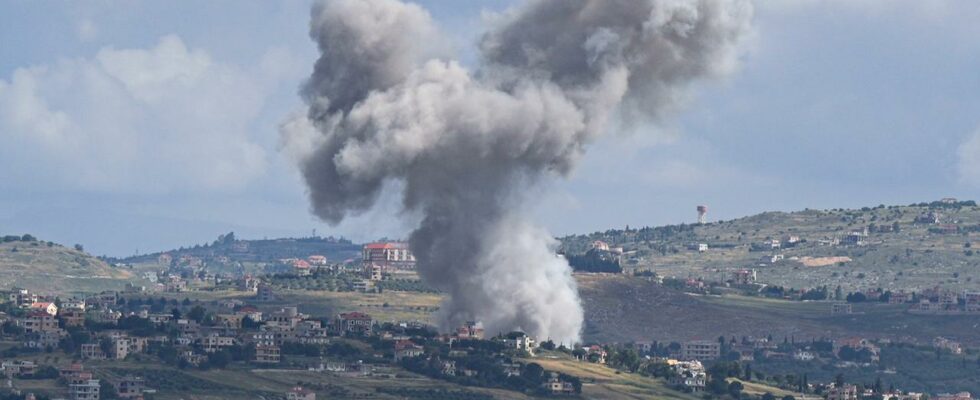interview
The fear of an escalation in northern Israel is justified, says Islamic scholar Steinberg. At the same time, we must wait and see to what extent the rhetoric actually reflects determination.
tagesschau.de: If the Israeli army approves the plans for intervention in Lebanon, how much closer is an Israeli army deployment in southern Lebanon? The Jerusalem Post wrote of a “toughening of the rhetoric”.
Guido Steinberg: The rhetoric has indeed become more intense in the last two weeks, but so has the fighting itself, on both sides. Last week, the Israelis killed a high-ranking Hezbollah commander. As a result, Hezbollah has fired more rockets at Israel, and with greater range than before.
In this respect, we are also experiencing a de facto escalation. And the big question now is to what extent the Israelis will follow up on their threats and actually launch a major attack.
To person
Guido Steinberg is an Islamic scholar and employee of the German Institute for International and Security Affairs (SWP) in Berlin. His research focuses on the countries of the Near and Middle East. From 2002 to 2005 he was the terrorism advisor in the Federal Chancellery.
The voices calling for intervention are getting louder
tagesschau.de: Internationally, there is great concern about further escalation. In your view, is this concern justified?
Steinberg: Absolutely. We have been discussing this issue since at least October 8th of last year. Ever since Hezbollah began firing rockets, mortars and other weapons at Israel in response to the events in and around Gaza.
Early on, important Israeli politicians called for a preventive war against Hezbollah. The spokesman was always Yoav Galant, the Minister of Defense. These voices have become louder in recent weeks.
My impression is that the decision as to whether there will actually be a major war has not yet been made. But there are increasing signs that the events in Gaza could also lead to a major escalation in the north.
Unity on Hezbollah
tagesschau.de: Only at the weekend did cracks in communication become visible, when the Israeli army announced ceasefires or tactical pauses for aid deliveries to the Gaza Strip and the government claimed to have no knowledge of this. Is it different in relation to Lebanon?
Steinberg: Yes, that is actually somewhat different. The news from the Israeli army that the plans are now in place and ready for adoption is accompanied by warnings that the Prime Minister has also echoed.
Only last week, Benjamin Netanyahu hinted that a major Israeli action could take place. His coalition partners are already hardliners against Hamas and Hezbollah.
There is a very homogeneous picture of opinion on the subject of Hezbollah. Nevertheless, in recent months we have seen time and again that the somewhat boastful rhetoric in Tel Aviv and Jerusalem does not lead to action. So we have to wait and see. It is very difficult to read from the outside to what extent the rhetoric actually reflects determination.
tagesschau.de: Is it actually a normal procedure in Israel that military plans are approved by the army and then made public?
Steinberg: The army has spoken out on its own initiative and that is actually unusual. Normally, the military prepares various plans for military operations, which are then discussed by politicians together with the military leaders without the public knowing about it.
Ultimately, Tuesday night’s news is significant only because it is consistent with the escalating rhetoric of Israeli policy. And that is why we must expect that there will indeed be major attacks against Hezbollah, perhaps not in the short term, but in the near future.
“It would mean a lot of civilian casualties”
tagesschau.de: What would such a step – another front in the north – mean for Israel?
Steinberg: That depends on how the Israeli military proceeds and whether it proceeds successfully. The Israeli plans for such an armed conflict are well known. Regardless of Tuesday’s announcement, the Israelis only have a chance of successfully waging this war if they try very quickly to destroy Hezbollah’s missiles as early as possible with the massive use of air power, rockets, drones, artillery and ground troops.
If they fail to do so, Hezbollah would be able to fire a large number of rockets, drones and cruise missiles at Israel, causing great destruction.
However, such a military strike would also result in many civilian casualties and cause great destruction in Lebanon. In my opinion, this is the great unknown: is the Israeli government, which is aware of this problem, actually prepared to take such a military risk and thereby further damage its own reputation, at least in the eyes of some.
Not the approach that German or American diplomats want
tagesschau.de: Let’s look at the diplomatic efforts that are going on in the background. The US envoy Amos Hochstein was in Lebanon at the time, also with the task of negotiating on behalf of Israel. On a day like this, the Israeli army announces that it has approved the plans. How does that fit together?
Steinberg: This is a very common approach from the Israeli perspective. On the one hand, there are indirect negotiations with Hezbollah. At the same time, the Israelis always believe that the pressure on the enemy must be increased because they supposedly do not understand any other language.
This is not the approach that German or American diplomats want. But this is the style of Israeli governments, especially but not only when they come from the right of center, as is currently the case.
The interview was conducted by Katja Keppner, tagesschau.de

